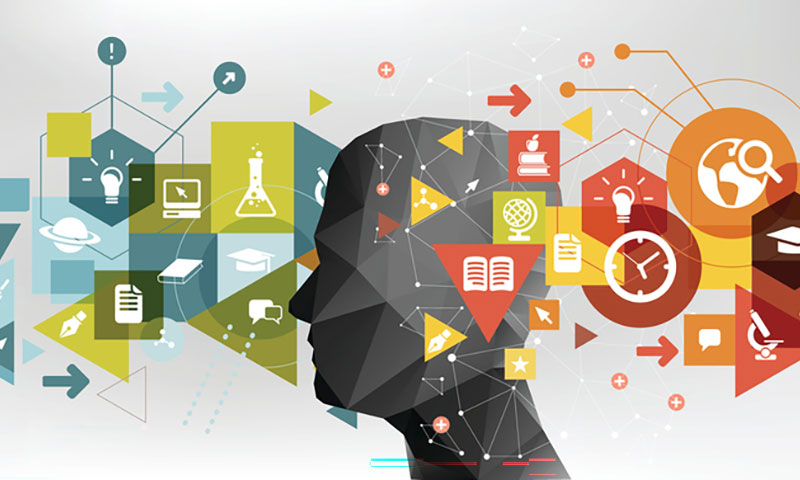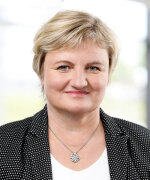Continuing Education
 Illustration: exdez/Digital Vision Vectors/Getty Images
Illustration: exdez/Digital Vision Vectors/Getty Images
Welcome to the Work–Education–Digitalization (WED) research cluster’s platform for continuing education opportunities.
Our expertise lies in promoting skill development and lifelong learning in the workplace. We offer special training courses for educational professionals, education and healthcare staff and managers.
During our pilot phase, our offerings are free of charge. These include designing hybrid work models, exploring new work and learning approaches in education, and utilizing digital technologies in healthcare.
If you are interested in an offering tailored specifically for your or your company’s needs, please contact us.
Our Current Range of Courses:

Building Bridges – Managers as Designers of Hybrid Working Models
Target Group: Managers and project managers at all levels who are not yet familiar with the basics of virtual leadership and want to master the challenges of dealing with hybrid teams.
Aim of the Course: In this seminar, you will learn how managers can understand, adapt, and shape their roles within hybrid work models, focusing on the key topics and objectives.
More information on “Building Bridges – Managers as Designers of Hybrid Working Models”
| Content: | The digital revolution is fundamentally changing the way we work and placing new demands on managers and employees. To successfully meet this challenge, a new understanding of leadership is required – one that views and shapes digital transformation not merely in terms of a technical shift but also as a cultural change. Managers must adapt to the evolving digital work environment by expanding their skills and redefining their roles – moving away from the image of a hierarchical, controlling figurehead to become supportive, empowering coaches. This requires a positive and appreciative corporate culture based on shared values, goals and rules. |
| Format: | The training takes place online. The number of participants is limited to 12. The duration will be between 3 and 6 hours. Participation in the event is free of charge. You will be awarded a certificate of attendance. |
| Speaker: | Dr. Christiane Stempel |
| WED Research Cluster: | This training is taken from the research project: ”DigiLead – Leadership in the Digital Working World.” The research project examines how managers understand, adapt, and shape their roles within hybrid working models, identifying the key topics and objectives. |

New Work and New Learning in the Education Sector
Target Group: Employees in continuing vocational training, adult education and higher education
Aim of the Course: In this seminar, we will start by clarifying what is meant by “New Work” and “New Learning” and what changes they are bringing to the professional and working world as a whole. The goal is to support you in addressing these issues and to provide insights into how other educational institutions are responding to changes in the work environment, including emerging action plans and challenges.
More information on “New Work and New Learning in the Education Sector”
| Content: | This seminar explores trends in the evolving structures and content of work and learning, examining both the current and potential future impact of New Work and New Learning in the field of education. What sets this seminar apart is that it brings different areas of education into dialog with each other: by looking at educational staff in continuing vocational training, adult education, and higher education and reflecting on the similarities and differences in dealing with change that can be observed in different areas of education and whether these areas can learn from each other. |
| Format: | The training is designed as a seminar and, in addition to approx. 60-minute input from the trainer, offers the opportunity for an intensive and open exchange with the participants talking about their experiences of New Work and New Learning in their everyday working lives. The seminar takes place online and lasts approx. 2–2.5 hours. The number of participants is limited to 10. The training takes place online via Zoom. Participation in the event is free of charge. You will be awarded a certificate of attendance. |
| Speakers: | The event is organized by the Center for Educational Professions and Organizational Research (ZeBOHagen) at the FernUniversität in Hagen. The ZeBOHagen aims to bolster the exchange between science and educational practice and to be a central point of contact that extends way beyond Hagen. |
| WED Research Cluster: | This further training course arises from the WED research project “LAdiB – Learning and Working in the Digital Revolution in the Education Sector.” |

DigiTeam: Shaping Teams in Hybrid Working Environments
Target Group: Managers and their teams who want to work together in a hybrid way, thereby promoting collaboration, especially social interaction and exchange.
Aim of the Course: This workshop identifies key levers for profitable hybrid collaboration, helping you define expectations and needs for team communication, exchange, and support, and how to effectively foster them in your working environment.
More information on “DigiTeam: Shaping Teams in Hybrid Working Environments”
| Content: | Hybrid collaboration in work teams combines the advantages of flexibility and direct exchange. In a hybrid model, physical presence and virtual work come together. This makes it possible to adapt work to individual life circumstances and, at the same time, offers the opportunity for personal exchange. This working model requires clear communication and well-defined processes to avoid misunderstandings and ensure productivity. Teams must actively work together to recognize and balance different needs and expectations. Consciously addressing these aspects promotes understanding and cohesion within the team, which is essential for long-term success. |
| Format: | In this online workshop, hybrid teams learn the basics and benefits of hybrid collaboration. By using interactive exchange methods, they identify optimization potential and jointly develop strategies to improve communication and processes. The workshop ends by creating an implementation plan and reflecting on how to promote the long-term efficiency and cohesion of the team. The number of participants is limited to 12. The training takes place online (3–4 hrs). Participation in the event is free of charge. You will be awarded a certificate of attendance. |
| Speaker: | Dr. Katja Siestrup |
| WED Research Cluster: | This training program has been developed by the research project “DigiTeam: Shaping Teams in Digital Working Environments.“ The research project aims to generate scientific insights and practical design guidelines for collaboration in hybrid work teams. |

The Dark Side of Digitalization
Target group: medical staff
Aim of the Course: The aim of the training course is to identify (unintended) negative consequences of digitalization and to learn about approaches on how to deal with them:
- Digitalization of the economy and society
- Consequences of digitalization
- Fears and prejudices
- Technostress
- Social media and gaming addiction
- Cyberbullying and hate crime
- Disinformation and deep fakes
More information on “The Dark Side of Digitalization”
| Content: | Our research focuses on the design and development of socio-technical information systems. “A socio-technical system is an organized set of people and technologies structured in a way to produce a specific outcome” (Cummings and Srivastva 1977, p. 55). In this context, the chair focuses on analyzing digitalization in business and society and shaping its development through various methods and techniques. We primarily research and teach how people deal with IT in their everyday lives and how these IT systems can be designed. Our primary focus of interest is on the key topics of digital diversity, digital ethics, and digital assistance. We focus on the coordination processes between people and systems in different contexts. |
| Format: | The training takes place online. The number of participants is limited to 12. The duration will be between 6 and 8 hours. Participation in the event is free of charge. You will be awarded a certificate of attendance. |
| Speakers: | Prof. Dr. Julia Krönung, Dr. Markus Nöltner |
| This training program has been developed from research carried out by the Chair of Business Administration, esp. Design of Socio-Technical Information Systems. |

Generational Diversity Among Patients in the Digitalized Healthcare System
Target group: Medical assistants, nursing staff, administrative staff
Aim of the Course: The training aims to explore ways to involve patients in the digitalization of medical practices and hospitals (e.g., through digital medical histories).
- Digital processes in the healthcare sector
- IT acceptance by different generations (especially older ones)
- Expectations, skills and prejudices
- Motivating patients for digital processes
More information on “Generational Diversity Among Patients in the Digitalized Healthcare System”
| Content: | Our research focuses on the design and development of socio-technical information systems. “A socio-technical system is an organized set of people and technologies structured in a way to produce a specific outcome” (Cummings and Srivastva 1977, p. 55). In this context, the chair focuses on analyzing digitalization in business and society and shaping its development through various methods and techniques. We primarily research and teach how people deal with IT in their everyday lives and how these IT systems can be designed. Our primary focus of interest is on the key topics of digital diversity, digital ethics, and digital assistance. We focus on the coordination processes between people and systems in different contexts. |
| Format: | The training takes place online. The number of participants is limited to 12. The duration will be between 6 and 8 hours. Participation in the event is free of charge. You will be awarded a certificate of attendance. |
| Speakers: | Prof. Dr. Julia Krönung, Dr. Markus Nöltner |
| This training program has been developed from research carried out by the Chair of Business Administration, esp. Design of Socio-Technical Information Systems. |

Emerging Technologies in the Healthcare Sector
Target group: Medical staff, key users, IT project managers, IT managers
Aim of the Course: The aim of this training course is to learn about the strategic opportunities, limits and acceptance of emerging technologies in the healthcare sector and how they can be applied:
- Innovation
- Collaboration tools
- Internet of Things
- Blockchain
- Artificial intelligence
- Augmented/virtual reality
- Quantum computing
More information on “Emerging Technologies in the Healthcare Sector”
| Content: | We are researching the design and development of socio-technical information systems. “A socio-technical system is an organized set of people and technologies structured in a way to produce a specific outcome” (Cummings and Srivastva 1977, p. 55). In this context, the chair focuses on analyzing digitalization in business and society and shaping its development through various methods and techniques. We primarily research and teach how people deal with IT in their everyday lives and how these IT systems can be designed. Our primary focus of interest is on the key topics of digital diversity, digital ethics, and digital assistance. We focus on the coordination processes between people and systems in different contexts. |
| Format: | The training takes place online. The number of participants is limited to 12. The duration will be between 6 and 8 hours. Participation in the event is free of charge. You will be awarded a certificate of attendance. |
| Speakers: | Prof. Dr. Julia Krönung, Dr. Markus Nöltner |
| This training program has been developed from research carried out by the Chair of Business Administration, esp. Design of Socio-Technical Information Systems. |

Mixed Reality for Professional Teaching Practice – Basic
Target Group: This continuing education program is primarily aimed at educational specialists, training staff and teachers in the healthcare sector who would like to incorporate VR or AR into their teaching or intend to work with it.
Aim of the Course: Participants are given a basic technical, didactic and conceptual introduction to mixed reality (MR). They will enhance their digital skills for their own teaching practice and become acquainted with the didactic possibilities of MR. Previous knowledge is not required.
More information on “Mixed Reality for Professional Teaching Practice – Basic”
| Content: | A technological and didactic introduction to MR applications and technology, and the use and conceptual design of MR scenarios:
|
| Format: | The training takes place online. The number of participants is limited to 12. The duration will be around 4 hours. Participation in the event is free of charge. You will be awarded a certificate of attendance. |
| Speakers: | Prof. Dr. Claudia de Witt, Jessica Felgentreu |
| WED Research Cluster: | This training program has been developed by the research project “XR4Healthcare – Mixed Reality in the Healthcare System – Research on Interaction-oriented Skills Acquisition.” |
Contact
If you are interested in an offering tailored specifically for your or your company’s needs, please contact us.
 Photo: Hardy Welsch
Photo: Hardy Welsch
Hrund Eysteinsdóttir
Project Coordination + Continuing Education
Email: hrund.eysteinsdottir
Phone: +49 2331 987-4131

